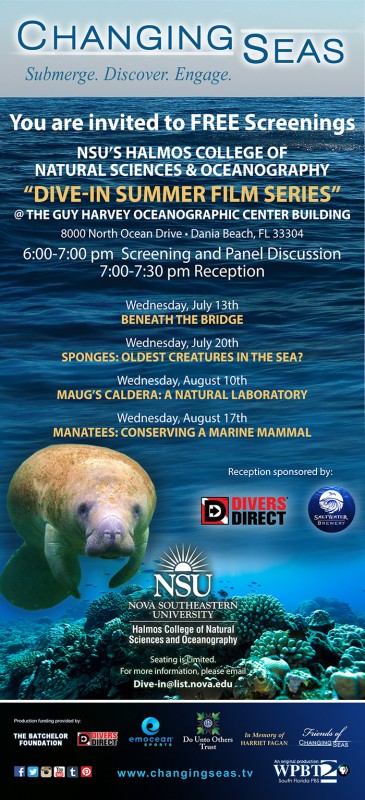NSU Newsroom
SharkBytes
Horizons
This version of NSU News has been archived as of February 28, 2019. To search through archived articles, visit nova.edu/search. To access the new version of NSU News, visit news.nova.edu.
This version of SharkBytes has been archived as of February 28, 2019. To search through archived articles, visit nova.edu/search. To access the new version of SharkBytes, visit sharkbytes.nova.edu.
NSU’s Halmos College of Natural Sciences and Oceanography to Host PBS Series Changing Seas, Aug.17
 NSU and WPBT2 South Florida PBS are inviting you to visit the Halmos College of Natural Sciences and Oceanography’s Ocean Campus for free screenings of the PBS series ‘Changing Seas’ as part of NSU’s Summer Dive-In film series. The screenings are scheduled for 6-7:00 p.m. Wednesdays, with a reception from 7-7:30 p.m. The audience will learn about exciting new ocean research, and will have the opportunity to ask questions during a panel discussion with renowned experts.
NSU and WPBT2 South Florida PBS are inviting you to visit the Halmos College of Natural Sciences and Oceanography’s Ocean Campus for free screenings of the PBS series ‘Changing Seas’ as part of NSU’s Summer Dive-In film series. The screenings are scheduled for 6-7:00 p.m. Wednesdays, with a reception from 7-7:30 p.m. The audience will learn about exciting new ocean research, and will have the opportunity to ask questions during a panel discussion with renowned experts.
NSU’s Ocean Campus is located at 8000 North Ocean Drive, Hollywood (in the Von D. Mizell and Eula Johnson State Park – formerly the John U. Lloyd State Park.) Parking is free.
Changing Seas is a public television series produced by WPBT2 in Miami, Florida, and funded by the Batchelor Foundation, Divers Direct, Emocean Sports, Du Unto Others Trust and the Friends of Changing Seas.
Scheduled dates for the 2016 screenings are:
Sponges: Oldest Creatures in the Sea?
Until recently there was scientific consensus that sponges were the first animals to branch off the “Animal Tree of Life,” a kind of family tree for all living and extinct animals on earth. But recent DNA research has cast doubt on that theory, with some scientists suggesting that ctenophores, also known as comb jellies, are an older lineage.
August 17:
Manatees: Conserving a Marine Mammal
Every winter, hundreds of manatees aggregate at Crystal River, Florida, attracted by the warmer, spring-fed clear waters. This sanctuary is also a treasure for scientists, who take advantage of these manatee gatherings to study them. From decades of visual ID studies to the most cutting-edge DNA research, experts hope that science will help conserve this beloved marine mammal.
For more information, please reach us via e-mail dive-in@list.nova.edu